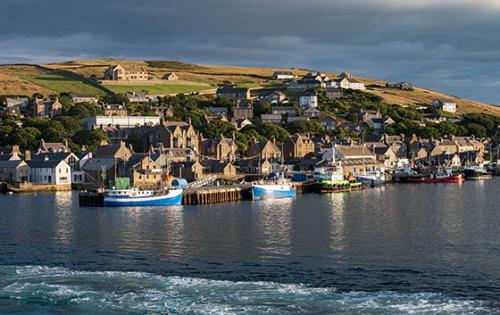
Scotland’s rural economy is varied and vibrant, but in many places it is also fragile. SEFARI research plays a key role in better understanding our rural communities, and the economy which underpins them. Our research examines the main drivers for change facing Scotland’s rural economy, and identifies ways in which land-based and other rural industries and government policy, can adapt to these challenges. While the focus is primarily on agriculture, research also covers other prominent sectors in the rural economy, such as forestry and tourism.
Sector Contact

Case Studies

Recent shifts toward protectionist trade policies—most notably from the United States—are reshaping the global trading system in ways that extend beyond traditional economic concerns. Protectionism refers to when countries introduce measures such as tariffs, quotas, or subsidies to limit imports and support their domestic industries. For the UK, navigating this uncertainty comes at the post-Brexit period, where trade resilience, food system stability, and climate commitments are increasingly intertwined. In this blog, we explore how these shifts—both escalating tensions and cautious diplomatic steps—are shaping UK trade relationships, food and agricultural markets, climate ambitions, and the future of multilateral cooperation. Drawing from current data, recent events and policy updates, we examine what these developments mean for UK policymakers, businesses, and the wider global economy.
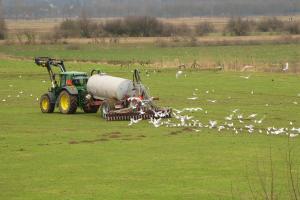
The interaction between nutrient management, food production and sustainability goals are complex, where both research and policy still remain fragmented. The report from the Nutrient Management Expert Group (NMEG), commissioned by DEFRA to tackle this complexity, was published in May 2024, containing the detailed assessment of the key policy and 15 recommendations. This blog summarises the key takeaways from this work.
Slurry Spreader (Credit: Saxifraga, Harry van Oosterhout, CC BY-NC-SA)

To mark this year’s International Day of Rural Women, our colleague Ana Vuin from Rural Policy Centre at SRUC, offers her insight on the role of women in agriculture and rural communities, challenges of representation, health and wellbeing, as well as opportunities to foster inclusive and fair rural society.
Title image: Hands together (Photo by Hannah Busing, Unsplash)
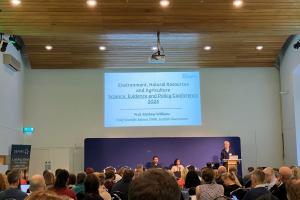
Climate Change Adaptation is one of the key items on the policy agenda in Scotland, and this was the main focus at this year’s ENRA Science, Evidence and Policy conference.
Organised by the Scottish Government’s Rural & Environmental Science and Analytical Services (RESAS) and held at Edinburgh’s Dynamic Earth, the conference brought together researchers and policymakers from across the rural and environment research and policy landscape in Scotland and showcased Scottish Government (RESAS) funded research evidence that is supporting climate change adaptation.
Title Image: Opening keynote by Prof Mathew Williams (Photo by Alöna Roitershtein)
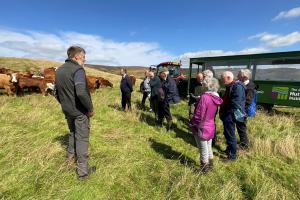
Climate-positive farming is key to Scotland’s climate change adaptation and mitigation.
In this blog, Prof Lorna Dawson, Knowledge Broker for Environment, reflects on her visit to the Climate-Positive Farming Initiative at the James Hutton Institute's Glensaugh Farm.
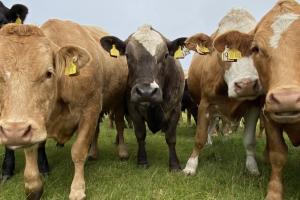
SEFARI Gateway are a silver sponsor at this year’s A3 Scotland conference - a not-for-profit two-day conference for the Animal Health, Agritech and Aquaculture (AAA) sectors, attracting attendees from all over the world to Inverness, to participate in plenaries, breakouts, investor panel and start up pitching, and sessions on funding, international showcase, skills and emerging solutions in AI, robotics, and sensors.
Our work across the Scottish Government’s Environment, Natural Resources and Agriculture (ENRA) Strategic Research Portfolio makes a substantial contribution to the A3 sector in Scotland. Read on to find out more about our A3 related work.
Cattle in Orkney (Photo by Alöna Roitershtein)
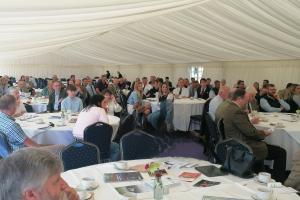
Supported by SEFARI GAteway, the Royal Bank of Scotland, the RSA, and in particular the RSA Fellows Borders Network and the RSA Fellows Rural and Environmental Issues network Scotland and NFU Mutual, over 100 guests attended the Business breakfast from 8:30 until 10:30, in the Members Marquee, organised and welcomed by RSA fellow Mrs Ann Packard, FRSA, HonFRIAS.
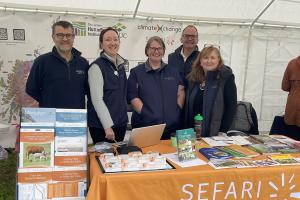
During this year’s GO Falkland gathering, in the foothills of the mighty East Lomond Hill on the beautiful Falkland estate, an enthusiastic collective of farmers, growers, artists, scientists and policymakers came together to discuss what Regenerative Farming, Forestry, Land Use and Food means for them. During the event, we shared experiences and insight to collaboratively work towards the shared goals of the sustainable future.
SEFARI and SEFARI Gateway were there to contribute to and support these conversations over the two days. Find out more in this blog.
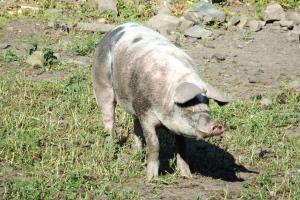
Collaboration amongst partners in an agri-food supply chain can bring benefits for its members and boost the chain competitiveness. However, often such collaboration needs an incentive to motivate change.
In this blog, Cesar Revoredo-Giha discusses how reducing GHG emissions may provide such an incentive for supply chains to become not only more collaborative but also fairer for agri-food producers.
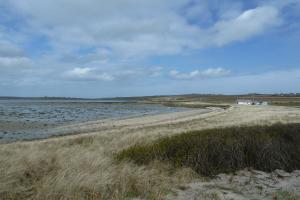
In December 2022, Mairi Gougeon, (then) Cabinet Secretary for Rural Affairs and Islands and Kate Forbes (then) Cabinet Secretary for Finance and the Economy, committed to apply a rural lens to projects funded under NSET. - The Scottish Government’s National Strategy for Economic Transformation (NSET), which was published earlier the same year. Applying this rural lens should ensure that all activities that are part of NSET take account of the specific circumstances of Scotland’s rural communities.
In response to this announcement, SEFARI colleague Dr Jane Atterton (SRUC) was successfully awarded SEFARI Gateway funding to set up a Specialist Advisory Group (SAG). The group’s aim was to provide advice to rural policy officials in the Scottish on designing rural lens guidance for their policy colleagues across government.

What can young people's social connections tell us about their migration patterns in rural Scotland?
Youth out-migration in Scotland’s rural communities remains a significant concern, and increasing levels of youth retention, in-migration, and return are seen as key to longer-term population sustainability. While youth out-migration in rural places is often linked to limited employment and housing opportunities and constraints of services in rural places, evidence also shows that experiences of belonging, and family connections are important in shaping young people's migration patterns.
Our new Gateway funded project therefore, seeks to generate novel insights into the level of social networks among young people (16 – 24) as community-based assets supporting their economic, social, and health needs and their impact on shaping migration patterns of young people in rural Scotland.
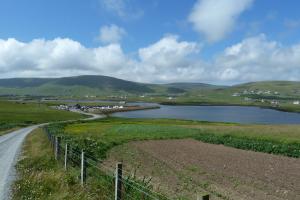
Here at SEFARI, we strive to make the world more sustainable, greener, and equal and we’ve got an amazing team of people who make this possible. As its International Women’s Day, we’ve decided to highlight some of the work done by our female researchers and/or our research that is addressing key issues affecting women.
From supporting rural women in the Arctic in making low carbon transitions, to closing the gender pay gaps, to sector-leading research - we cover it all in this blog post.
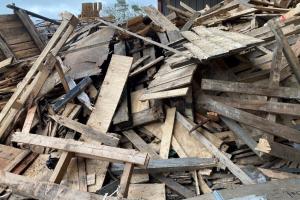
Overconsumption and high levels of resource use are challenges contributing significantly to the climate and biodiversity crises. Scotland is currently only 1.3% circular, meaning that over 98% of the products consumed in Scotland come from newly extracted materials, and only a small proportion of these materials are ‘cycled back’ into use in the economy. In other words, most of what we buy, use or consume in Scotland is not reused again within Scotland, despite the huge potential to do so.
In this blog we give a brief overview of what the ‘Circular Economy’ is and how it aims to address the issue of consumption and waste in a world where resources are finite. This blog also introduces the ‘Circular Economy: people, behaviours and skills’ project, which is part of the current RESAS Strategic Research Programme (2022-2027).
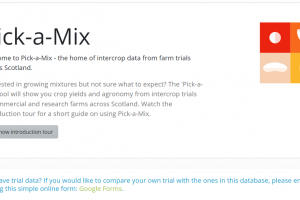
The way we currently produce food and other agricultural products is under threat from the changing climate, depleted biodiversity, and declining availability of natural resources used to boost productivity. We know that farming systems need to shift towards co-delivering for nature and net zero, but this needs to happen without compromising production and food security.
Farming faces huge challenges from these pressures, while coping with climate variability, degradation of prime agricultural land, and restrictions on pesticide use. In this blog, we try to help with what farmers can do in the short-term to address these multiple challenges.
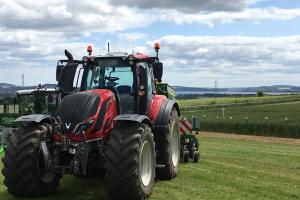
On the 4th of July Arable Scotland returns for the 5th year, a field event which is becoming a firm favourite in the calendar with everyone interested in food production. Farmers, producers, researchers and the policy community come together to discuss key issues such as innovative and sustainable farming.
SEFARI researchers and SEFARI Gateway colleagues will be joining in the conversations at Arable Scotland again. In this blog, find out more about which colleagues will be there and how our research is supporting the arable sector.
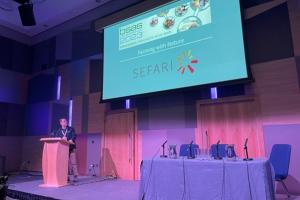
SEFARI Gateway was delighted to sponsor and host a session at the British Society of Animal Science (BSAS) Conference at the Birmingham International Conference Centre at the end of March. Its annual conference regularly attracts several hundred delegates, drawn from across academia and the livestock sector.
BSAS is a charity that ‘works to improve the understanding of all aspects of animal science and to ensure research and knowledge transfer has a practical and beneficial application’, so you can see the obvious parallel with SEFARI!
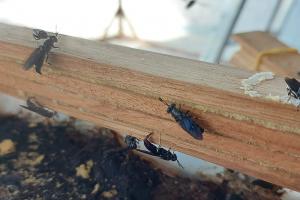
Scotland has the potential to become a global leader in the insect farming and industry, which could help with circular economy objectives, reducing food waste, and support the aquaculture, agriculture, and food and drink sectors. Equally, as there is an increasing demand for sustainable protein sources for animal feed in the country, insects could reduce our dependence on imported protein sources and create opportunities for local production.
In this blog, Pattanapong and Lorna discuss the current status of insect farming in Scotland, including the regulations and key challenges that impact the industry and draw upon insights from their project funded by the SEFARI Gateway Innovative Knowledge Exchange Fund.
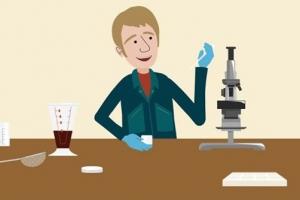
Roundworms are an ongoing challenge for sheep farmers in Scotland, threatening the health and welfare of animals. Whilst acute infection can be fatal, most roundworm infections result in poor growth rates and reduced production efficiency. To meet upcoming environmental targets, roundworm infections must be controlled effectively and sustainably.
Therefore, and with the aid of SEFARI Gateway Innovative Knowledge Exchange (IKE) funding, we have developed a farmer-facing, free, online tool which helps with the interpretation of faecal egg count results for roundworms in sheep called “FEC Check”.
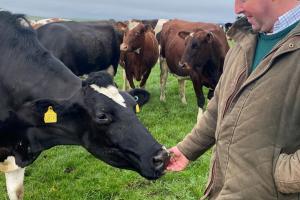
Fineview, a dairy farm managed by the Clark family in Dumfries and Galloway, is part of the innovative First Milk dairy cooperative which aims to deliver healthy fresh milk on sound environmental principles. Why not take a virtual tour and hear how delivering quality milk products needs a nurtured healthy soil, the encouragement of biodiversity, healthy cows and a sustainable farm enterprise.
This virtual tour is one of a series of SEFARI Gateway Innovative Knowledge Exchange funded tours designed to provide you with access to the many research facilities across Scotland whilst also giving you a taste of some of the work we do. Across SEFARI, world leading pioneering research is being undertaken that can really make a difference on the ground.
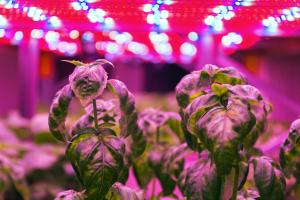
During COP26 the contribution of agriculture and food production to greenhouse gas emissions was discussed and, goals were set to tackle the global challenges of climate change. With COP27 taking place this November, it is becoming increasingly evident and more important than ever that we address sustainable practices on an individual and community level, as well as at the global level.
Pagination
Blog

The return of retaliatory tariffs

Domestic agriculture provides most of our food consumption and contributes to export revenues and rural livelihoods. At the same time, it is a key sector where management and production changes can reduce pressure on the environment, including air, water, climate and biodiversity.

On October 11, 2024, the UN Women published a statement in anticipation of the International Day of Rural Women.